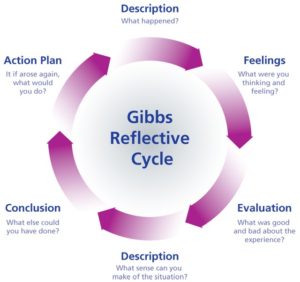The (reflective) practitioner allows himself to experience surprise, puzzlement, or confusion in a situation which he finds uncertain or unique. He reflects on the phenomenon before him, and on the prior understandings which have been implicit in his behavior. He carries out an experiment which serves to generate both a new understanding of the phenomenon and a change in the situation.
– Donald Schon
Most of us have experienced the surprise, puzzlement or confusion that Schon speaks of at some point along our learning journeys. We often reflect on what might have gone wrong or right on a particular day and how we could improve things in the future. The time that we set aside to reflect on our experiences to learn from them for the future is called Reflective Practice. We may not always have a chance to go back and undo what we did. However, we can make a difference to our future by thinking about the experience, learning from it and developing a plan of action for next time.
Why is reflection important?
Reflection has a direct impact on how we teach. The quality of our pedagogical practices and the methods we employ to teach can directly impact the experiences we offer to our students, and thus influence their learning. It requires teachers to consistently take the opportunity to think and reflect on their own teaching. Consistency is key as it engages teachers in a process of continuous learning.

Reflection is personal and different people have different ways of practising it. There are various working models available to support a reflective practitioner, each with its own advantages and suitability.
Reflection allows us to see the big picture and use our inner voice to learn and move forward. Sometimes, it is a wonderful way to challenge assumptions and see things in a new light. This process comes with its own reward including a better understanding of oneself, development of one’s metacognitive abilities and increased motivation for autonomy, control and competence.
The most recommended model for Reflective Practice is Gibb’s Reflective Cycle. Other interesting works that you can look up are by Dewey, Schön, Kolb and Boud.
Use the key questions given below to support your personal reflection that could be maintained in a journal or in any other form, should you choose to record your reflections. You can also distance yourself from the situation and think of what advice you would offer to someone in a similar situation.

You can ask a peer or a group of people to share their advice or suggestions. However, it is up to you to evaluate the sensitivity of what is being discussed. One clear example is of peer observation or walk-ins. You could have a peer observe a lesson with a clear focus on the key areas that you wish to develop.
Timing is crucial. This will mean that you are neither too early (right after the lesson) nor too delayed (much after the lesson) to make effective changes.
One question that helped me during lesson feedback was ‘What did your students learn?’
This question helped me focus on the student’s learning rather than the activities that I had planned to support their learning.
Student feedback on your lessons is another way to measure the impact of teaching. Plan questions that allow students to share their ideas and thoughts on what was taught.

Donald Schon also encourages educators to think about reflection-in-action and reflection-on-action. The former involves spontaneously taking informed decisions and thinking on one’s feet while keeping in mind past experiences and feelings. The latter takes place once the event has occurred.
Personally, reflection is a tool that has many benefits when used consistently. We ask students at the end of our lesson to share their key learnings to ensure that the learning sticks; the same holds true for teachers. Finally, reflection is a powerful tool that can help reignite our way individually and collectively to improvement.
References
- Developing Reflective Practice – A guide for beginning teachers by Debra McGregor and Lesley Cartwright
- Gibbs Reflective Cycle (1988) from Learning by Doing: A Guide to Teaching and Learning Methods, Oxford Polytechnic, by Graham Gibbs
- Flourishing Lives: Reflective Practice Groups report by Nicola Naismith
- The Reflective Practitioner – How Professionals Think in Action by Donald Schon


manish
Is reflective practice more about working on our social-emotional skills or day-to-day learning?
Jeneeta Chacko says
Dear Sushma, Reflection can be on a past action, social interaction or emotions, as each on its own can be complex. Paying attention to your emotions, what prompts them, and how you deal with negative ones is also very important both professionally and personally as it further helps in increasing self-awareness which is a key component of emotional intelligence. So, it will be a mélange of both as it enhances your social-emotional skills while encouraging active engagement of day to day learning, of self and others. Thanks
Kunal
Test